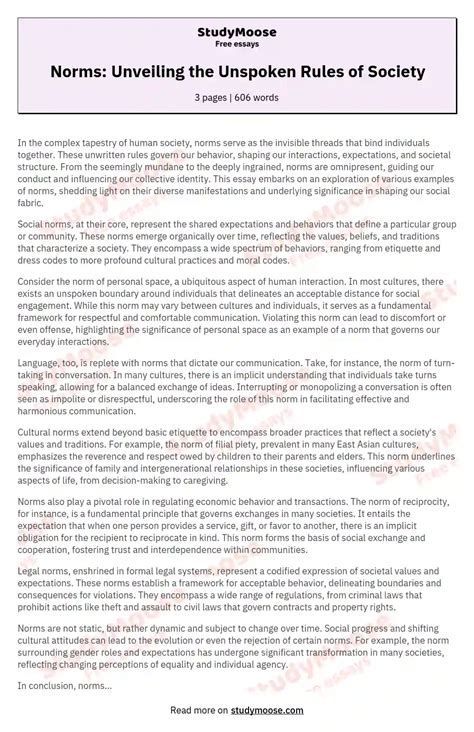
Navigating social interactions can often feel like deciphering a complex, unwritten code. A recent online discussion has brought to light numerous “unspoken rules” that govern everyday behavior in society, revealing the subtle norms and expectations that individuals often learn through observation and experience. These range from elevator etiquette to restaurant practices and highlight the often-unacknowledged agreements that facilitate smoother social interactions.
The thread, which gained traction online, prompted users to share a wide array of these hidden norms, offering insights into the often-confusing landscape of social expectations. One prevalent theme revolves around respecting personal space and boundaries. As one commenter noted, “Don’t stand too close to people in line.” This sentiment reflects a broader understanding of respecting individual comfort zones in public settings. The discussion underscores that many of these rules are designed to maintain order, avoid discomfort, and foster a sense of mutual respect in shared spaces.
Another common category involves technological etiquette. In an age increasingly dominated by digital communication, unspoken rules regarding phone usage and social media interactions are particularly relevant. For example, “Don’t watch videos out loud on your phone in public” is a frequently cited rule, highlighting the importance of being mindful of noise pollution in communal environments. Similarly, the expectation to “avoid speakerphone in public unless absolutely necessary” reinforces the idea of respecting others’ auditory space.
Restaurant settings also have their own set of unspoken rules. “Don’t snap your fingers to get the server’s attention” is a prime example of behavior considered impolite and disrespectful. This rule points to the importance of treating service staff with courtesy and recognizing their workload. Other restaurant-related norms include avoiding lengthy conversations on the phone while at the table and being mindful of how long you occupy a table, especially during peak hours.
Elevator etiquette emerged as another significant area of discussion. The unwritten code of conduct within an elevator car includes rules such as “facing forward” and “avoiding conversation unless you know the other person.” These norms are rooted in the desire to minimize discomfort and awkwardness in a confined space. Furthermore, the rule of “allowing people to exit before trying to enter” promotes efficiency and prevents congestion.
The thread also highlighted the significance of reciprocity and consideration in social interactions. For example, when someone holds a door open for you, it’s considered polite to acknowledge their gesture with a “thank you.” Similarly, when using a public restroom, leaving the space in a reasonably clean condition is seen as a basic act of consideration for the next user. These small acts of kindness and respect contribute to a more harmonious social environment.
One user encapsulated the essence of these unspoken rules by stating, “Most of these rules boil down to just being considerate of other people.” This highlights the core principle underlying many of these norms: that social interactions are smoother and more pleasant when individuals are mindful of the needs and feelings of those around them. By adhering to these unspoken rules, individuals contribute to a culture of mutual respect and consideration, fostering a more positive and cooperative society.
The revelation of these unspoken rules can be particularly helpful for individuals who are new to a particular culture or social setting. Understanding these norms can prevent unintentional social faux pas and facilitate smoother integration into a community. Moreover, being aware of these rules can empower individuals to navigate social situations with greater confidence and ease.
The discussion surrounding unspoken rules serves as a reminder that society operates on a complex web of implicit agreements and expectations. While these rules may not be explicitly taught or written down, they play a crucial role in shaping our interactions and maintaining social order. By recognizing and adhering to these norms, individuals can contribute to a more harmonious and considerate society.
The online thread underscores the importance of empathy and social awareness in navigating everyday life. By being mindful of the needs and feelings of others, individuals can effectively adhere to these unspoken rules and foster more positive and productive social interactions. This heightened awareness can lead to a more inclusive and understanding society, where individuals feel more comfortable and confident in their interactions with others.
The viral discussion surrounding unspoken rules also highlights the ever-evolving nature of social norms. As society changes and new technologies emerge, these rules are constantly being re-evaluated and adapted. What was considered acceptable behavior in the past may no longer be appropriate in the present, and vice versa. Therefore, it is essential to remain open to learning and adapting to these evolving social expectations.
In addition to promoting smoother social interactions, adherence to unspoken rules can also have a positive impact on personal and professional relationships. By demonstrating consideration and respect for others, individuals can build trust and rapport, fostering stronger connections with those around them. This can lead to greater success in both personal and professional endeavors.
The widespread interest in unspoken rules suggests a deep-seated desire for social harmony and understanding. Individuals are seeking to decipher the hidden codes that govern social behavior in order to navigate their interactions more effectively and contribute to a more positive social environment. This underscores the importance of ongoing dialogue and reflection on the norms and expectations that shape our society.
Furthermore, the discussion surrounding unspoken rules can serve as a valuable tool for promoting greater empathy and understanding across different cultures and social groups. By recognizing that different groups may have different sets of unspoken rules, individuals can avoid making assumptions and approach interactions with greater sensitivity and awareness. This can lead to more meaningful and respectful relationships across cultural boundaries.
The exploration of unspoken rules also raises important questions about the nature of social conformity. While adherence to these norms can promote social harmony, it is also important to recognize the potential for these rules to reinforce existing power structures and inequalities. Therefore, it is essential to critically examine these rules and challenge those that perpetuate injustice or discrimination.
In conclusion, the online discussion surrounding unspoken rules provides valuable insights into the complex and often-unacknowledged norms that govern social behavior. By understanding these rules and adhering to them mindfully, individuals can contribute to a more harmonious, considerate, and inclusive society. The ongoing dialogue about unspoken rules is essential for fostering greater social awareness, empathy, and understanding in an ever-evolving world. These rules are more than just quirky observations; they represent the collective effort to create a functional and respectful society. The online forum serves as a continuous learning environment where individuals share their observations and contribute to a better understanding of social dynamics. It is a testament to the human desire for connection and the ongoing effort to navigate the complexities of social life with grace and consideration. The very act of identifying and discussing these rules can lead to greater self-awareness and a more conscious approach to social interactions.
The sharing of unspoken rules online extends beyond mere observation; it’s a form of collective social learning. By openly discussing these norms, individuals are not only educating themselves but also contributing to a broader understanding of what is expected and considered acceptable in various social contexts. This collective intelligence helps to demystify social interactions and makes them more accessible, especially for those who may find navigating social cues challenging. This includes individuals from different cultural backgrounds, those with social anxiety, or even younger generations who are still learning the ropes of social etiquette. The transparency gained through these discussions can significantly reduce social anxiety and foster a more inclusive environment where everyone feels more comfortable and confident in their interactions. The open forum allows for a continuous feedback loop, where rules are questioned, refined, and adapted to reflect changing social values and norms. This dynamic process ensures that social etiquette remains relevant and responsive to the needs of a diverse and evolving society.
The act of articulating unspoken rules also serves as a form of social critique. By bringing these norms to the surface, individuals can examine their underlying assumptions and potential biases. This critical examination can lead to a re-evaluation of social practices and the promotion of more equitable and inclusive behaviors. For example, a discussion about gendered expectations in social interactions can challenge traditional norms and encourage more egalitarian behavior. Similarly, an analysis of cultural differences in etiquette can foster greater cross-cultural understanding and respect. The ability to openly discuss and critique these norms is essential for promoting social progress and creating a more just and equitable society. The online forum provides a safe space for individuals to voice their concerns and challenge outdated or harmful social practices, contributing to a more inclusive and tolerant social environment. This critical dialogue is essential for ensuring that social norms reflect the values of equality, respect, and inclusivity.
The impact of openly discussing unspoken rules extends beyond individual behavior; it also influences the broader social culture. By making these norms more transparent, societies can foster a greater sense of shared understanding and promote more consistent behavior. This can lead to a more predictable and comfortable social environment, where individuals feel more secure in their interactions. Furthermore, the increased awareness of social expectations can encourage individuals to be more mindful of their actions and to consider the impact of their behavior on others. This heightened awareness can lead to a more compassionate and considerate society, where individuals are more likely to act with empathy and understanding. The collective effort to define and share unspoken rules contributes to a stronger sense of community and shared identity, fostering a more cohesive and harmonious social environment. This shared understanding is essential for building trust and fostering positive relationships among individuals and groups.
In addition to fostering social harmony, the articulation of unspoken rules also has practical benefits in various professional and educational settings. By understanding the norms of workplace etiquette, individuals can navigate office politics more effectively and build stronger professional relationships. Similarly, awareness of classroom expectations can help students succeed academically and socially. The ability to understand and adapt to different social contexts is a valuable skill that can enhance individuals’ success in both their personal and professional lives. Educational institutions and workplaces can benefit from incorporating discussions of social etiquette into their training programs, helping individuals to develop the social intelligence necessary to thrive in diverse environments. This proactive approach can foster a more inclusive and supportive culture, where individuals feel valued and respected for their unique contributions. The sharing of unspoken rules can also serve as a valuable resource for mentors and coaches, providing them with a framework for guiding and supporting individuals in their personal and professional development.
The discussion of unspoken rules also highlights the importance of cultural context in shaping social behavior. What is considered polite or acceptable in one culture may be considered rude or inappropriate in another. Therefore, it is essential to be aware of cultural differences and to avoid making assumptions based on one’s own cultural norms. Cross-cultural communication and understanding are increasingly important in today’s globalized world, and the ability to navigate different cultural contexts is a valuable skill. Educational institutions and organizations can promote cross-cultural understanding by providing training programs and resources that highlight cultural differences in social etiquette. This can help individuals to avoid misunderstandings and build stronger relationships with people from different cultural backgrounds. The sharing of personal experiences and perspectives can also foster greater empathy and understanding, promoting a more inclusive and respectful global community. The recognition of cultural diversity is essential for creating a harmonious and equitable world, where individuals are valued for their unique cultural identities and contributions.
Frequently Asked Questions (FAQ)
Q1: What are “unspoken rules” in the context of social behavior?
A1: “Unspoken rules” refer to the unwritten, often subtle norms and expectations that govern everyday behavior in society. These are the implicit agreements that individuals learn through observation and experience, shaping how they interact with others in various social settings. They aren’t explicitly taught but are understood and generally adhered to in order to maintain social harmony and avoid causing offense or discomfort. Examples include elevator etiquette, restaurant practices, and respecting personal space in public.
Q2: Why is it important to be aware of these unspoken rules?
A2: Awareness of unspoken rules is crucial for navigating social interactions smoothly and effectively. Understanding these norms can prevent unintentional social faux pas, facilitate smoother integration into a community, and empower individuals to approach social situations with greater confidence. Moreover, adhering to these rules demonstrates consideration and respect for others, fostering stronger relationships and a more positive social environment. Being unaware of these rules can lead to misunderstandings, social isolation, or even negative perceptions from others.
Q3: How do unspoken rules evolve over time?
A3: Unspoken rules are not static; they evolve over time as society changes, and new technologies emerge. What was considered acceptable behavior in the past may no longer be appropriate in the present, and vice versa. Factors like technological advancements (e.g., cell phone usage), shifts in cultural values, and changing demographics can all influence the evolution of these norms. Therefore, it is essential to remain open to learning and adapting to evolving social expectations to stay current and avoid inadvertently violating social norms.
Q4: Are unspoken rules universal, or do they vary across cultures?
A4: Unspoken rules are not universal; they vary significantly across cultures. What is considered polite or acceptable in one culture may be deemed rude or inappropriate in another. This cultural variability underscores the importance of cross-cultural awareness and sensitivity. It’s crucial to avoid making assumptions based on one’s own cultural norms and to approach interactions with people from different backgrounds with an open mind and a willingness to learn. Examples include differences in eye contact, personal space, and gift-giving customs.
Q5: Where can I learn more about unspoken rules and social etiquette?
A5: Learning about unspoken rules can come from various sources, including observing social interactions, seeking guidance from mentors or experienced individuals, reading books or articles on social etiquette, and participating in online forums or discussions where people share their observations and experiences. Additionally, being open to feedback and reflecting on your own social interactions can provide valuable insights. Travel and exposure to different cultures can also enhance your understanding of diverse social norms. Finally, professional development courses or workshops on interpersonal skills and communication can offer structured learning opportunities in this area.









